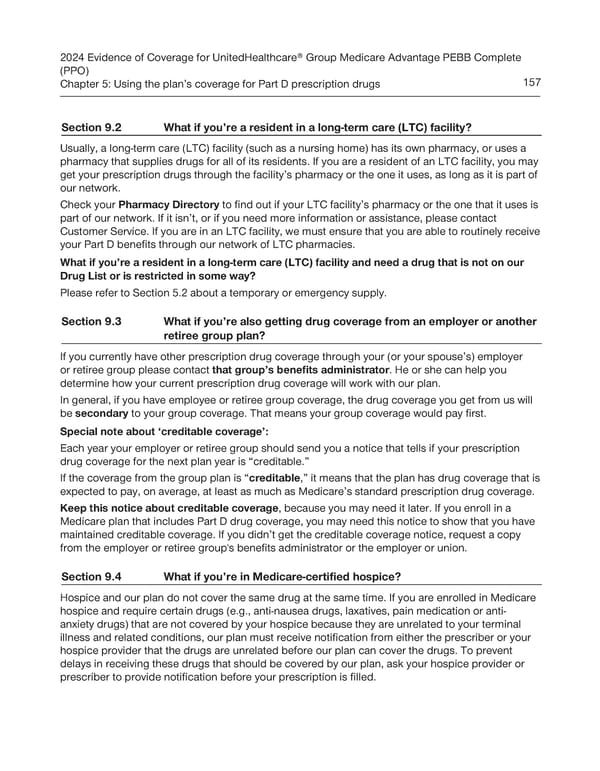2024 Evidence of Coverage for UnitedHealthcare® Group Medicare Advantage PEBB Complete (PPO) Chapter 5: Using the plan’s coverage for Part D prescription drugs 157 Section 9.2 What if you’re a resident in a long-term care (LTC) facility? Usually, a long-term care (LTC) facility (such as a nursing home) has its own pharmacy, or uses a pharmacy that supplies drugs for all of its residents. If you are a resident of an LTC facility, you may get your prescription drugs through the facility’s pharmacy or the one it uses, as long as it is part of our network. Check your Pharmacy Directory to find out if your LTC facility’s pharmacy or the one that it uses is part of our network. If it isn’t, or if you need more information or assistance, please contact Customer Service. If you are in an LTC facility, we must ensure that you are able to routinely receive your Part D benefits through our network of LTC pharmacies. What if you’re a resident in a long-term care (LTC) facility and need a drug that is not on our Drug List or is restricted in some way? Please refer to Section 5.2 about a temporary or emergency supply. Section 9.3 What if you’re also getting drug coverage from an employer or another retiree group plan? If you currently have other prescription drug coverage through your (or your spouse’s) employer or retiree group please contact that group’s benefits administrator. He or she can help you determine how your current prescription drug coverage will work with our plan. In general, if you have employee or retiree group coverage, the drug coverage you get from us will be secondary to your group coverage. That means your group coverage would pay first. Special note about ‘creditable coverage’: Each year your employer or retiree group should send you a notice that tells if your prescription drug coverage for the next plan year is “creditable.” If the coverage from the group plan is “creditable,” it means that the plan has drug coverage that is expected to pay, on average, at least as much as Medicare’s standard prescription drug coverage. Keep this notice about creditable coverage, because you may need it later. If you enroll in a Medicare plan that includes Part D drug coverage, you may need this notice to show that you have maintained creditable coverage. If you didn’t get the creditable coverage notice, request a copy from the employer or retiree group's benefits administrator or the employer or union. Section 9.4 What if you’re in Medicare-certified hospice? Hospice and our plan do not cover the same drug at the same time. If you are enrolled in Medicare hospice and require certain drugs (e.g., anti-nausea drugs, laxatives, pain medication or anti- anxiety drugs) that are not covered by your hospice because they are unrelated to your terminal illness and related conditions, our plan must receive notification from either the prescriber or your hospice provider that the drugs are unrelated before our plan can cover the drugs. To prevent delays in receiving these drugs that should be covered by our plan, ask your hospice provider or prescriber to provide notification before your prescription is filled.
 UnitedHealthcare PEBB Complete EOC (2024) Page 162 Page 164
UnitedHealthcare PEBB Complete EOC (2024) Page 162 Page 164